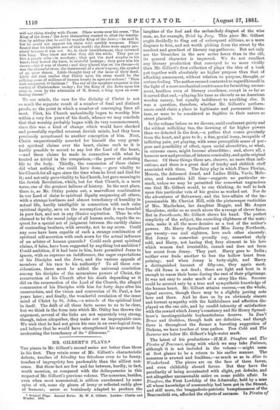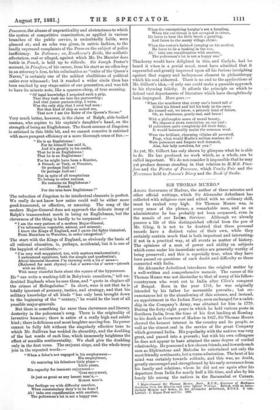MR. GILBERT'S PLAYS.* Tin pieces in Mr. Gilbert's second series
are better than those in his first. They retain some of Mr. Gilbert's characteristic defects, touches of frivolity too frivolous even to be funny, touches of impropriety less pardonable than the silliest non- sense. Bat these last are few and far between, hardly, in fact, worth mention, as compared with the delinquencies in this respect of Mr. Gilbert's previous volume. The nonsense, besides, even when most nonsensical, is seldom unredeemed by some spice of wit, some sly gleam of irony or reflected ruddy glow of humour; never so brainlessly adapted to produce the
• Original Plays. Second Series. By W. S. Gilbert. London: Ghetto and Windus. 1881.
laughter of the fool and the melancholy disgust of the wise man, as, for example, Trial by Jury. This piece Mr. Gilbert ought decidedly to fling out of subsequent editions, as a mere disgrace to him, and not worth picking from the street by the neediest and greediest of literary rag-gatherers. But not only are the blemishes in the new series fewer than in the old, its general character is improved. We do not recollect any literary production that conveyed to us more vividly than Mr. Gilbert's first collection of plays the idea of a book put together with absolutely no higher purpose than that of affording amusement, without relation to purpose, thought, or serious feeling. The author seemed contented to regard himself in the light of a mere mechanical contrivance for furnishing amuse- ment, heedless even of literary excellence, except in so far as it served that end,—playing his tune as cleverly as an American wooden canary, but equally indifferent to anything else. It was a question, therefore, whether Mr. Gilbert's perform- ances could claim a place in legitimate and permanent litera- ture, or were to be considered as fugitive in their nature as street placards.
In the volume before us we discern, amid exuberant gaiety and the wildest rollicking fun, the dawning of far higher powers than we detected in the first,—a pathos that comes genuinely from the heart, and goes to it ; a fine, genial irony, incapable of inflicting pain, yet playing, with some perceptible sense of pur- pose and possibility of effect, upon social absurdities, or what, in extreme cases, might become absurdities ; and, above all, a humour new and peculiar, of intense comicality, and quite original flavour. Of these things there are, observe, no more than indi- cations, and there is a great deal of trashy and childish stuff associated with them. The fairy play in which Pince Florian, Monate, the deformed dwarf, and Ladies Hilda, Vavir, Mein- sine, and Amanthis kill time—suggests no particular re- mark, unless we may be permitted the somewhat ungracious one that Mr. Gilbert would, to our thinking, do well to look upon this particular vein of his genius as worked out. Nor do the adventures of Belvawney, and the love-affairs of the im- pressionable Mr. Cheviot Hill, with the picturesque rusticities of Mrs. Macfarlane, her daughter Maggie, and Mr. Angus Macalister, strike us as much above the average of clever farce. But in Sweethearts, Mr. Gilbert shows his hand. The perfect simplicity of the subject, the exceeding slightness of the mate- rials, make it all the more decisive as a test of the author's powers. Mr. Harry Spreadbrow and Miss Jenny Northcott, age twenty - one and eighteen, love each other sincerely. But Jenny is somewhat proudly coy, somewhat shyly cold, and Harry, not having that fiery element in his love which women find irresistible, cannot and does not force her secret from Jenny. They part. Harry goes to India ; neither ever finds another to free the hollow heart from paining ; and when Jenny is forty-eight, and Harry a distinguished baronet of fifty-one, they again meet. The old flame is not dead; there are light and heat in it enough to warm their home during the rest of their pilgrimage. It was not easy to make much of a story like this. S access could be secured only by a true and sympathetic knowledge of the human heart. Mr. Gilbert attains success,—on the whole, signal success, though there may be a slightly jarring note here and there. And he does so by an obviously sincere and fervent sympathy with the faithfulness and affection dis- played on the one side, and by candid intensity of satisfaction with the reward which Jenny's constancy and Sir Henry Spread- brow's inextinguishable boyheartedness deserve. In Dan'l Druce and Gretchen, though both are defective, and though there is throughout the former a haunting suggestion of Dickens, we have touches of true pathos. Tom Cobb and The Sorcerer are below Mr. Gilbert's high-water mark.
The latest of his productions—H.M.S. Pinafore and The Pirates of Penzance, along with which we may take Patience, although it is not included in the volume —might seem at first glance to be a return to his earlier manner. The nonsense is avowed and limitless,—as much so as in Alice in Wonderland. The pieces are on the face of them farces, and even childishly absurd farces. But they have the peculiarity of being accentuated with slight, yet definite, and not altogether unreasonable satire on some public affair. In Pinafore, the First Lordship of the Admiralty, held by a man all whose knowledge of seamanship had been got in the Strand, and still more, the braggadocio-patriotic bumptiousness of the Beaconsfield era, afforded the objects of sarcasm. In Pirates of Penzance, the abuses of unpracticality and abstractness to which the system of competitive examination, as applied in various branches of the public service, is undoubtedly liable, were glanced at; and an echo was given, in satiric fashion, to the loudly expressed complaints of the Press on the subject of police inefficiency. In Patience ; or, Bunthorne's Bride, the aesthetic affectation, real or alleged, against which Mr. Du Meunier does battle in Punch, is held up to ridicule. Sir Joseph Porter's account, in Pinafore, of his career, from his start as an office-boy in an attorney's firm, to his culmination as "ruler of the Queen's Navee," is certainly one of the mildest ebullitions of political satire ever witnessed ; but it reached a wider circle than has been reached by any stage-satire of our generation, and was felt to have its minute note, like a sparrow-chirp, of true meaning.
"Of legal knowledge I acquired such a grip,
That they took me into the partnership ; And that junior partner-ship, I ween, Was the only ship that I ever had seen : But that kind of ship so suited me,
That now I am the Ruler of the Queen's Navee."
Very much better, however, is the claim of Ralph, able-bodied seaman, who aspires to his captain's daughter's hand, on the strength of being an Englishman. The finest essence of Jingoism is satirised in this little bit, and we cannot conceive it satirised with more-pungent efficiency or a more thorough sense of fun :-
" He is an Englishman !
For he himself has said it, And it's greatly to his credit, That he is an Englishman! That he is an Englishman !
For he might have been a Roosian, A French, or Turk, or Proosian, Or perhaps Itali-an!
Or perhaps Itali-an !
But in spite of all temptations To belong to other nations, He remains an Englishman !
Hurrah !
For the true-born Englishman !"
The redaction of Jingoism to its intellectual elements is perfect. We really do not know how satire could well be either more good-humoured, or effective, or amusing. The song of the modern Major-General does not approach the delicate irony of Ralph's transcendent merit in being an Englishman, but the cleverness of the thing is hardly to be surpassed :—
" I am the very pattern of a modern Major-Gineral, I've information vegetable, animal, and mineral; I know the Kings of England, and I quote the fights historical, From Marathon to Waterloo, in order categorical."
The start with the Kings of England, as obviously the basis of all rational education, is, perhaps, accidental, but it is one of the happiest of accidents,— "I'm very well acquainted, too, with matters mathematical ; I understand equations, both the simple and quadratical; About binomial theorem I'm teeming with a lot o' news— (Bothered for next rhyme)—Lot o news—lot o' news—(struck
with an idea), With many cheerful facts about the square of the hypotenuse.
He " can write a washing-bill in Babylonic cuneiform," tell un- doubted Raphaels when he sees them, and " quote in elegiacs all the crimes of Heliogabalus." In short, were it not that he is totally ignorant of gunnery, tactics, and strategy, and that his military knowledge of all kinds " has only been brought down to the beginning of the " century," he would be the best of all possible major-generals.
But there is something far rarer than cleverness and literary dexterity in the policeman's song. There is the originality of inventive humour ; there is satire of a really high and subtle kind ; there is delicious and most laughter-moving fan. Its power cannot be fully felt without the singularly effective tune to which Mr. Sullivan has wedded its absurdity, and the doubling of the last words of each line, which immensely heightens the effect of maudlin sentimentality. We shall give the doubling only in the first verse. The serjeant sings, and the whole troop join in the repeated words :— " When a felon's not engaged in his employment—
His employment,
Or maturing his felonious little plans—
Little plans, His capacity for innocent enjoyment- ' Cent enjoyment,
Is jest as great as any honest man's,—
Honest man's.
Our feelings we with difficulty smother, When constabulary duty's to be done.1 Alk I take one consideration with another, The policeman's lot is not a happy one.
When the enterprising burglar's not a burgling, When the cut-throat is not occupied in crime, He loves to hear the little brook a gurgling,
And listen to the merry village chime.
When the coster's finished jumping on his mother,
He loves to lie a basking in the sun,
Ali ! take one consideration with another, The policeman's lot is not a happy one."
Thackeray would have delighted in this, and Carlyle, had he. heard it when in a genial mood, must have admitted that it superseded and greatly improved upon all his furious inveighing against that sugary and lachrymose element in philanthropy which his soul abhorred. There is no end to the applications of Mr. Gilbert's idea,—if only one could make a passable approach to his rhyming felicity. It affords the principle on which to defend vast departments of literature which have thoughtlessly been impugned. Here goes :—
When the murderer that every one's heard tell o' Killed his friend and hid his body in the cave, He turned out, we know, a princely kind of fellow, Oh, so handsome, gently-sad, and brave !
With a philosophic sense of moral beauty,
We impose-a stern restriction on our zeal ; If policemen quite completely did their duty,
It would lamentably maim the common weal.
Were the brilliant, charming villains all arrested, Pray, what would Mudie's million readers do ? Were poisoners and forgers well detested, Alas, fair lady novelists, for you!'
As yet, Mr. Gilbert has only shown by glimpses what he is able to do. He has produced no work which, as a whole, can be called important. We do not consider it impossible that he may yet produce dramas standing in that relation to H.M.S. Pina- fore and the Pirates of Penzance, which Vanity Fair and the Neu:comes hold to Jeames's Diary and the Book of Snobs.































 Previous page
Previous page